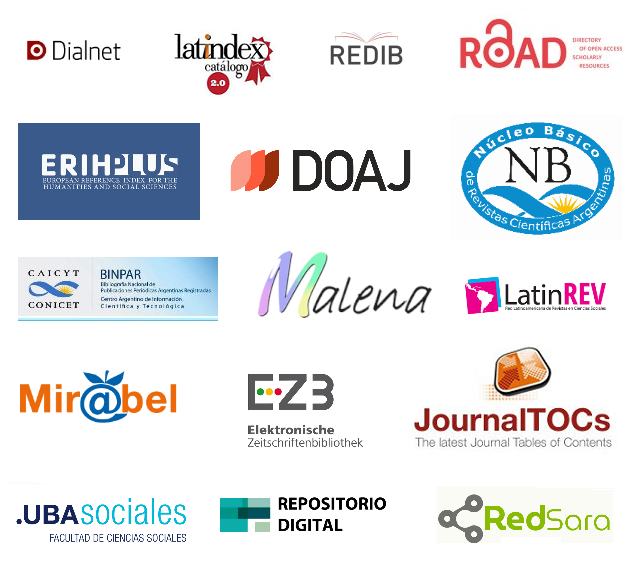La democracia contemporánea y la pregunta por un nuevo nomos: el caso de las elecciones presidenciales de EE.UU. en 2016
Resumen
Texto completo:
PDFDOI: https://doi.org/10.62174/aei.7584
Referencias
Arendt, H. (2016). Entre el pasado y el futuro. Ocho ejercicios sobre la reflexión política. Ariel: Buenos Aires.
BBC News. Cambridge Analytica: MPs recall suspended chief Alexander Nix. 22 de marzo del 2018. Disponible en: http://www.bbc.co.uk/news/uk-43501815.7.
BBC News. Facebook data breach is ‘turning point’ for online privacy, says Matt Hancock. 22 de marzo del 2018. Disponible en: http://www.bbc.co.uk/43504436.
Bessi, A. y Ferrara, E. (2016). “Social bots distort the 2016 U.S. Presidential election online discussion”. First Monday, 21(11). Disponible en: dx.doi.org7090.
Bratton, B. (2015). The Stack. On Software and Sovereignty. The Mit Press: Cambridge, Massachusetts.
C-Span. Cambridge Analytica and Data Privacy. Hearing before the U.S. Senate Judiciary Committee. 16 de mayo del 2018. Disponible en: https://www.c-span.org/video/?445621-1/cambridge-analytica-whistleblower-christopher-wylie-testifies-data-privacy
Deleuze, G. (2006). Conversaciones. Valencia: Pre-textos.
Dewey, J. (2004). La opinión pública y sus problemas. Madrid: Morata.
Green, J. y Issenberg, S. “Inside the Trump bunker, with days to go”. En: Bloomberg Businessweek. 27 de octubre de 2016. Disponible en: https:// goo.gl/9BjK4K
Gutiérrez, C. “Clinton vs Trump, la contienda en las redes sociales”. En: Fortuna. 6 de julio del 2016. Recuperado de https://goo.gl/vgexW3.
Henriksen, E. (2019). “Big data, microtargeting, and governmentality in cyber-times. The case of the Facebook-Cambridge Analytica data scandal”. Department of Political Science, University of Oslo. Disponible en: http://www.duo.uio.no
Johnson, E. “Trump campaign turns to psychographic’ data firm used by Cruz”. En: National Review. 5 de agosto de 2016. Disponible en: https://goo.gl/us04QN.
Kojève, A. (2005). La noción de autoridad. Buenos Aires: Nueva Visión.
Marradi, A., Archenti, N., Piovani, J. (2007). Metodologías de las ciencias sociales. Buenos Aires: Emecé editores.
Milner, R. y Phillips, W. (2016). “Dark Magic: The memes that made Donald Trump’s victory”. En: D. Lilleker, D. Jackson, E. Thorsen y A. Veneti (eds.). US election analysis 2016: Media, voters and the campaign (pp. 84-85). Poole: Centre for the Study of Journalism.
Plot, M. (2017). “Trump y lo politico”. En: Bordes. Revista de política, derecho y sociedad. Núm. 6. Disponible en: https://publicaciones.unpaz.edu.ar/article/view/202
Risso, L. “Brexit Means Brexit?” The Selected Proceedings of the Symposium, Akademie der Wissenschaften und der Literatur, Mainz 6-8 December, 2017.
Rodríguez-Andrés, R. (2018). “Trump 2016: ¿presidente gracias a las redes sociales?” Palabra Clave, 21(3), 831-859.
Rosenberg, M., Confessore, N. y Cadwalladr, C. “How Trump Consultants Exploited the Facebook Data of Millions”. En: The New York Times. 17 de marzo del 2018. Disponible en: https://www.nytimes.com/trump-campaign.html
Schmitt, C. (2003). El nomos de la tierra. En el Derecho de Gentes del “Jus publicum europaeum”. Editorial Struhart & Cía: Buenos Aires.
United States Census Bureau. (s.f.). Historical Reported Voting Rates. U.S. Departmente of Commerce. https://www.census.gov/data/tables/time-series/demo/voting-and-registration/voting-historical-time-series.html
Enlaces refback
- No hay ningún enlace refback.
Estadísticas
Visitas al Resumen:598
PDF:470
ISSN/ISSN-L: 2250-4982
Indizaciones, directorios y redes



